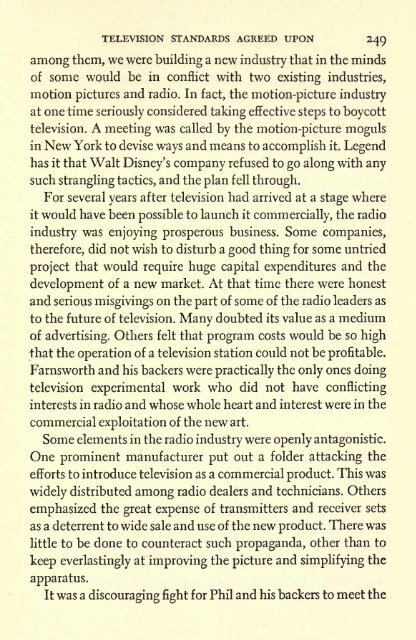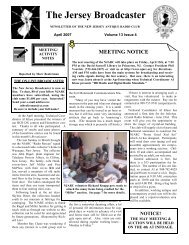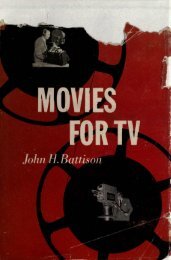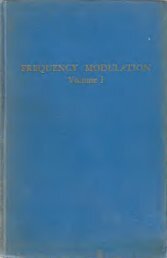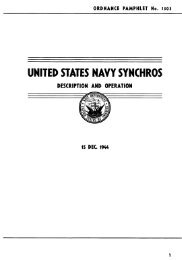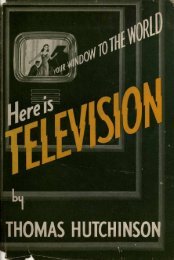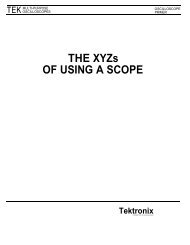- Page 2:
From the collection of the 7 n z m
- Page 7 and 8:
THE STORY OF TELEVISION THE LIFE OF
- Page 9:
TO HELEN and JESS
- Page 12 and 13:
8 CONTENTS 17. EXPERIMENTAL BROADCA
- Page 15 and 16:
Introduction THIS BOOK is a tribute
- Page 17 and 18:
INTRODUCTION 1 3 worth to assist in
- Page 19 and 20:
((D) A Boy's Purpose PHILO T. FARNS
- Page 21 and 22:
A BOY S PURPOSE 1J encouraged this
- Page 23 and 24:
A BOY'S PURPOSE 19 by outside readi
- Page 25 and 26:
A BOY'S PURPOSE 21 studies progress
- Page 27 and 28:
A BOY S PURPOSE 23 to reveal to Tol
- Page 29 and 30:
A BOY'S PURPOSE 25 problem, the sha
- Page 31 and 32:
A BOY S PURPOSE 2J the beam so that
- Page 33 and 34:
((2)) Frustration and Disappointmen
- Page 35 and 36:
FRUSTRATION AND DISAPPOINTMENT 3! e
- Page 37 and 38:
FRUSTRATION AND DISAPPOINTMENT 33 m
- Page 39 and 40:
FRUSTRATION AND DISAPPOINTMENT 35 e
- Page 41 and 42:
PROMISE OF FINANCIAL HELP 37 an off
- Page 43 and 44:
PROMISE OF FINANCIAL HELP 39 courag
- Page 45 and 46:
PROMISE OF FINANCIAL HELP 41 I aske
- Page 47 and 48:
PROMISE OF FINANCIAL HELP 43 system
- Page 49 and 50:
PROMISE OF FINANCIAL HELP 45 no ide
- Page 51 and 52:
PROMISE OF FINANCIAL HELP 47 City,
- Page 53 and 54:
PROMISE OF FINANCIAL HELP 49 very s
- Page 55 and 56:
PROMISE OF FINANCIAL HELP 51 corded
- Page 57 and 58:
PROMISE OF FINANCIAL HELP 53 up a c
- Page 59 and 60:
PROMISE OF FINANCIAL HELP 55 with F
- Page 61 and 62:
PROMISE OF FINANCIAL HELP 57 is dou
- Page 63 and 64:
PROMISE OF FINANCIAL HELP 59 field,
- Page 65 and 66:
PROMISE OF FINANCIAL HELP 6l for so
- Page 67 and 68:
PROMISE OF FINANCIAL HELP 63 Mr. Mc
- Page 69 and 70:
PROMISE OF FINANCIAL HELP 65 memora
- Page 71 and 72:
PROMISE OF FINANCIAL HELP 6j plaine
- Page 73 and 74:
PROMISE OF FINANCIAL HELP 69 one, a
- Page 75 and 76:
PROMISE OF FINANCIAL HELP I would l
- Page 77 and 78:
PROMISE OF FINANCIAL HELP 73 north.
- Page 79 and 80:
THE GREEN STREET LABORATORY 75 and
- Page 81 and 82:
THE GREEN STREET LABORATORY tubes.
- Page 83 and 84:
THE GREEN STREET LABORATORY 79 diss
- Page 85 and 86:
THE GREEN STREET LABORATORY 8l The
- Page 87 and 88:
THE GREEN STREET LABORATORY 83 toda
- Page 89 and 90:
CRUDE BEGINNINGS THE FIRST TELEVISI
- Page 91 and 92:
CRUDE BEGINNINGS THE FIRST TELEVISI
- Page 93 and 94:
CRUDE BEGINNINGS THE FIRST TELEVISI
- Page 95 and 96:
CRUDE BEGINNINGS THE FIRST TELEVISI
- Page 97 and 98:
CRUDE BEGINNINGS THE FIRST TELEVISI
- Page 99 and 100:
it, CRUDE BEGINNINGS THE FIRST TELE
- Page 101 and 102:
((6)) Televising Motion Pictures of
- Page 103 and 104:
TELEVISING MOTION PICTURES 99 cigar
- Page 105 and 106:
((7)) The Growth of Speculative Val
- Page 107 and 108:
THE GROWTH OF SPECULATIVE VALUE 103
- Page 109 and 110:
CLEARING THE IMAGE OF SMUDGE AND BL
- Page 111 and 112:
CLEARING THE IMAGE OF SMUDGE AND BL
- Page 113 and 114:
CLEARING THE IMAGE OF SMUDGE AND BL
- Page 115 and 116:
CLEARING THE IMAGE OF SMUDGE AND BL
- Page 117 and 118:
((9)) First Demonstration to Backer
- Page 119 and 120:
FIRST DEMONSTRATION TO BACKERS 11 5
- Page 121 and 122:
FIRST DEMONSTRATION TO BACKERS givi
- Page 123 and 124:
TELEVISION BROADCASTING OVER TELEPH
- Page 125 and 126:
TELEVISION BROADCASTING OVER TELEPH
- Page 127 and 128:
TELEVISION BROADCASTING OVER TELEPH
- Page 129 and 130:
TELEVISION BROADCASTING OVER TELEPH
- Page 131 and 132:
TELEVISION BROADCASTING OVER TELEPH
- Page 133 and 134:
FARNSWORTH MOVES TO PHILADELPHIA 12
- Page 135 and 136:
FARNSWORTH MOVES TO PHILADELPHIA 13
- Page 137 and 138:
FARNSWORTH MOVES TO PHILADELPHIA 13
- Page 139 and 140:
FARNSWORTH MOVES TO PHILADELPHIA 4
- Page 141 and 142:
((12)) Multipactor Tubes Demonstrat
- Page 143 and 144:
MULTIPACTOR TUBES DEMONSTRATED 139
- Page 145 and 146:
MULTIPACTOR TUBES DEMONSTRATED 141
- Page 147 and 148:
TELEVISION SHOW AT FRANKLIN INSTITU
- Page 149 and 150:
TELEVISION SHOW AT FRANKLIN INSTITU
- Page 151 and 152:
FARNSWORTH VISITS ENGLAND AND GERMA
- Page 153 and 154:
FARNSWORTH VISITS ENGLAND AND GERMA
- Page 155 and 156:
FARNSWORTH VISITS ENGLAND AND GERMA
- Page 157 and 158:
PATENTS 153 were taken. It was nece
- Page 159 and 160:
((16)) Cross-Licensing Arrangement
- Page 161 and 162:
CROSS-LICENSING ARRANGEMENT WITH A.
- Page 163 and 164:
CROSS-LICENSING ARRANGEMENT WITH A.
- Page 166 and 167:
s*tf The first television camera se
- Page 168 and 169:
162 THE STORY OF TELEVISION nized t
- Page 170 and 171:
164 THE STORY OF TELEVISION seemed
- Page 172 and 173:
l66 THE STORY OF TELEVISION was obs
- Page 174 and 175:
l68 THE STORY OF TELEVISION them to
- Page 176 and 177:
((18)) Phil and His Family No SMALL
- Page 178 and 179:
1J2 THE STORY OF TELEVISION wire I
- Page 180 and 181:
174 THE STORY OF TELEVISION Pern. P
- Page 182 and 183:
176 THE STORY OF TELEVISION of his
- Page 184 and 185:
178 THE STORY OF TELEVISION As we w
- Page 186 and 187:
l8o THE STORY OF TELEVISION thirtee
- Page 188 and 189:
l82 THE STORY OF TELEVISION to offe
- Page 190 and 191:
184 THE STORY OF TELEVISION Farnswo
- Page 192 and 193:
l86 THE STORY OF TELEVISION Company
- Page 194 and 195:
((20)) Television Network Possibili
- Page 196 and 197:
190 THE STORY OF TELEVISION one sin
- Page 198 and 199:
THE STORY OF TELEVISION they wanted
- Page 200 and 201:
Detail = 50 lines, / 2,500 picture
- Page 202 and 203:
((21)) Standards Proposed for Telev
- Page 204 and 205:
ig6 THE STORY OF TELEVISION ting de
- Page 206 and 207: 198 THE STORY OF TELEVISION equipme
- Page 208 and 209: 20O THE STORY OF TELEVISION worth d
- Page 210 and 211: 202 THE STORY OF TELEVISION this in
- Page 212 and 213: 204 THE STORY OF TELEVISION the cam
- Page 214 and 215: 206 THE STORY OF TELEVISION headed
- Page 216 and 217: 208 THE STORY OF TELEVISION detail
- Page 218 and 219: 21O THE STORY OF TELEVISION bility
- Page 220 and 221: ((23)) Facsimile and Fog Penetratio
- Page 222 and 223: 214 THE STORY OF TELEVISION any dre
- Page 224 and 225: 2l6 THE STORY OF TELEVISION any thi
- Page 226 and 227: ((24)) Defense of the Patent Depart
- Page 228 and 229: 22O THE STORY OF TELEVISION broadca
- Page 230 and 231: 222 THE STORY OF TELEVISION the lab
- Page 232 and 233: 224 THE STORY OF TELEVISION hardly
- Page 234 and 235: 226 THE STORY OF TELEVISION always
- Page 236 and 237: Public Demonstrations in Los Angele
- Page 238 and 239: 230 THE STORY OF TELEVISION While i
- Page 240 and 241: 232 THE STORY OF TELEVISION It was
- Page 242 and 243: 234 THE STORY OF TELEVISION for our
- Page 244 and 245: 236 THE STORY OF TELEVISION purchas
- Page 246 and 247: 238 THE STORY OF TELEVISION were co
- Page 248 and 249: THE STORY OF TELEVISION stockholder
- Page 250 and 251: R.C.A. Licenses IN HIS DREAM of bec
- Page 252 and 253: 244 THE STORY OF TELEVISION mercial
- Page 254 and 255: 246 THE STORY OF TELEVISION the par
- Page 258 and 259: 2 JO THE STORY OF TELEVISION effort
- Page 260 and 261: 252 THE STORY OF TELEVISION mitted.
- Page 262 and 263: ((29)) At Long Last Commercial Tele
- Page 264 and 265: 256 THE STORY OF TELEVISION all the
- Page 266 and 267: 2j THE STORY OF TELEVISION in his e
- Page 268 and 269: 260 THE STORY OF TELEVISION been ex
- Page 270 and 271: 262 THE STORY OF TELEVISION cathode
- Page 272 and 273: 264 THE STORY OF TELEVISION the lab
- Page 274: 266 THE STORY OF TELEVISION vision


